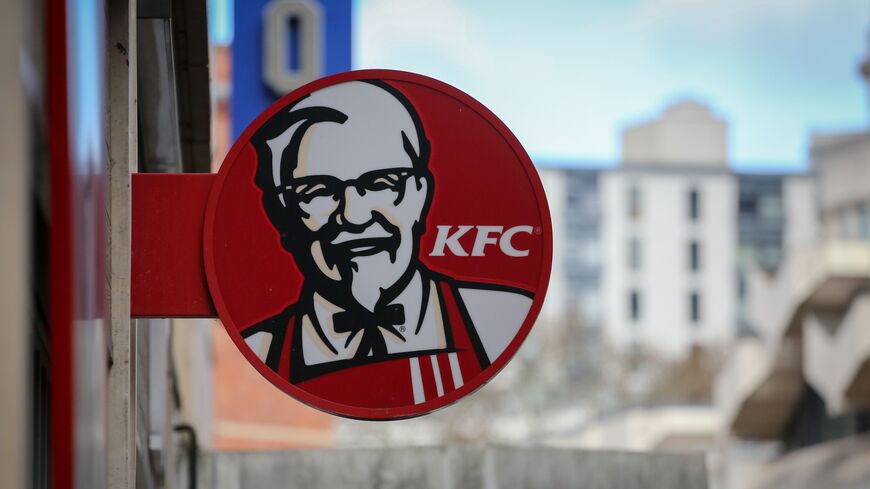The first KFC (Kentucky Fried Chicken) restaurant to open in Algeria reportedly closed on Wednesday following protests related to ongoing war in Gaza, but reopened later in the day, local outlets reported.
KFC's opening in the North African country was part of its expansion in the region. But media outlets including Al Jazeera, Arabic 21, TSA Algerie, ElDjazair El Djadida and others reported on Wednesday that the fast-food restaurant was forced to close the same day following protests in solidarity with Gaza. Google Maps indicated on Wednesday that the location is “permanently closed.”
But by Wednesday afternoon local time, TSA Algerie and Algerie 360 reported that the KFC branch had reopened.
Reached by Al-Monitor, KFC's press department did not immediately respond.
What happened: A branch of KFC opened in the Algiers suburb Dely Ibrahim on Sunday, according to posts on social media. The location is KFC’s first in the country. Regional outlets reported on Monday and Tuesday that large protests occurred outside the location in opposition to KFC’s alleged support for Israel.
"ماتكونش لا سمح الله".. وقفة أمام مطعم "كنتاكي" في #الجزائر للدعوة لمقاطعته بسبب دعمه الاحتلال#حرب_غزة pic.twitter.com/hgwWV2JLRr
— قناة الجزيرة (@AJArabic) April 15, 2024
Videos on social media showed the KFC’s iconic Colonel Sanders logo was removed from the fast-food restaurant.
🎥- السلطات الجزائرية تزيل اللافتة الإشهارية التي وُضعت على بناية "كنتاكي" وسط العاصمة #الجزائر، في ساعات متأخرة من أمس الإثنين، بعد 3 أيام من افتتاح أول مطعم لسلسلة المطاعم الأمريكية، وذلك بعد مجموعة من الاحتجاجات التي طالبت بإغلاق العلامة التجارية بسبب دعم الشركة لإسرائيل pic.twitter.com/nQikNLAzdv
— عربي بوست (@arabic_post) April 17, 2024
Some social media users reacted positively to the news of KFC’s reported closure. “Since it’s opening, there have been vocal boycotts, protests in front of it and condemnation of the granting of a license to its agency,” wrote one user who shared a video of the location without the KFC logo.
بعد أيام من افتتاح فرعها الأول، KFC الجزائر 🇩🇿 تزيل شعار علامتها وتُغلق أبوابها!
— 🇩🇿 أحمد داود 🇩🇿 (@AhmadDaoud14) April 17, 2024
منذ افتتاحها تعالت أصوات مقاطعتها، ووقفات احتجاجية أمامها، واستنكارٌ لمنح الترخيص لوكيلها! #الجزائر 🇩🇿
pic.twitter.com/rIaOG80xTi
The opening of a KFC branch in Algeria was notable due to the North African country traditionally being averse to Western food chains setting up shop.
Pro-Palestinian sentiment is strong in Algeria. On Wednesday, the North African state presented a resolution to the United Nations Security Council calling for the State of Palestine to be admitted as a full UN member.
KFC has locations in the following regional countries: Bahrain, Egypt, Iraq, Israel, Jordan, Kuwait, Lebanon, Morocco, Oman, the Palestinian Territories, Qatar, Saudi Arabia, Tunisia, Turkey and the United Arab Emirates, per its website.
The UAE-based Americana Restaurants operates KFC in the Middle East and North Africa and has 1,027 locations across the region, according to its website. Americana does not operate KFC in Israel. The restaurant has its own franchise in the country named KFC Israel.
Why it matters: Like other American fast-food chains, KFC has faced boycott calls in the Middle East and North Africa in relation to the war in Gaza and its perceived support for Israel. The Saudi news outlet Arab News reported in October that KFC is among the companies facing boycotts.
In a January statement, the Boycott, Divestment, Sanctions (BDS) movement listed KFC’s sister company Pizza Hut as an “organic boycott target.” Per the movement, which calls for a variety of anti-Israel boycotts, these boycotts were not initiated by BDS but are worthy of support due to the “brands’ complicity in Israel’s genocide and apartheid against Palestinians.”
Pizza Hut and KFC are both owned by the American corporation Yum! Brands.
The Witness, a London-based website that calls for boycotts of Israel, says on its website that KFC should be boycotted due to Yum! Brands’ investments in Israeli startups. In 2021, Yum! Brands announced its acquisition of the Israeli marketing platform Tictuk Technologies.
KFC and its affiliates have faced difficulties in relation to the Gaza war-related boycotts. Bloomberg reported in January that Americana cut nearly 100 jobs, mostly in Dubai.
During Yum! Brands’ Q4 2023 earnings call in February, CEO David Gibbs said “top line sales were impacted by the conflict in the Middle East region with varying degrees of impact across markets in the Middle East, Malaysia and Indonesia,” according to a call transcript.
Gibbs added that the impact “represented a low, single-digit headwind to Yum!’s overall fourth-quarter, same-store sales growth,” and that the trend has continued into Q1 2024, but they “expect the sales impact to decrease over the course of 2024.”
Yum! Brands reported a 5% growth in worldwide system sales in Q4, including 7% growth for KFC specifically, per a company press release.
Other companies have been similarly impacted by the war. In March, Starbucks’ Middle East operator AlShaya Group said it would lay off more than 2,000 people. Earlier this month, McDonald’s Israel agreed to sell its business back to the parent company. Both companies have faced boycotts and sales effects related to the conflict.
KFC has continued to expand in North Africa, despite the backlash. In February, the London-based food operator SSP said it won a contract to bring KFC, Costa Coffee and other brands to Egypt’s Hurghada International Airport. In October, Moroccan media reported that KFC opened two new restaurants in Rabat and Casablanca.



